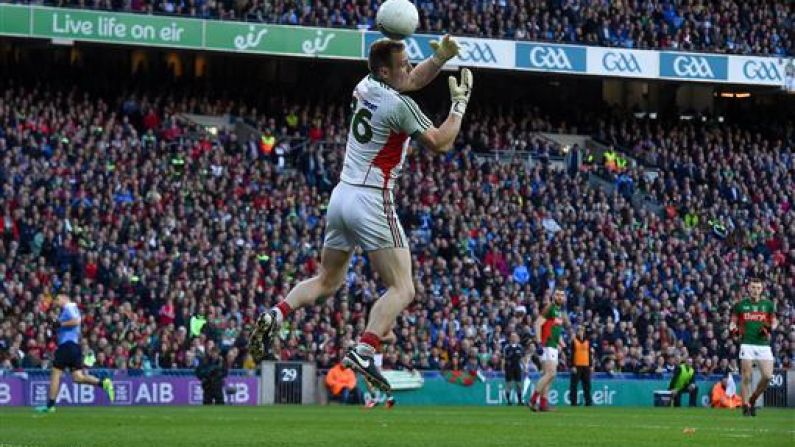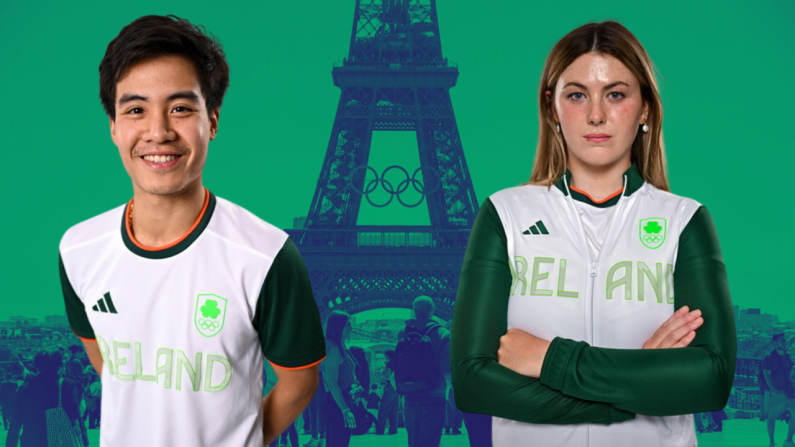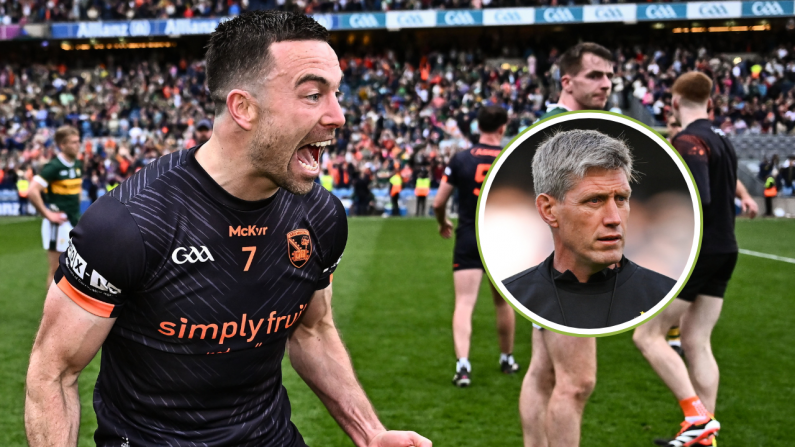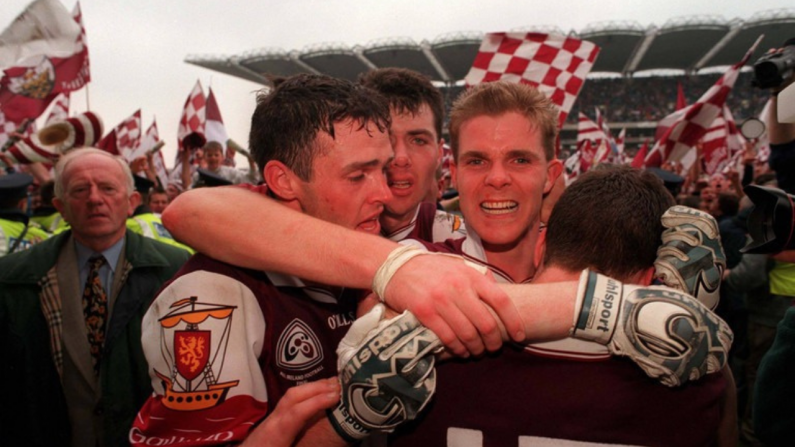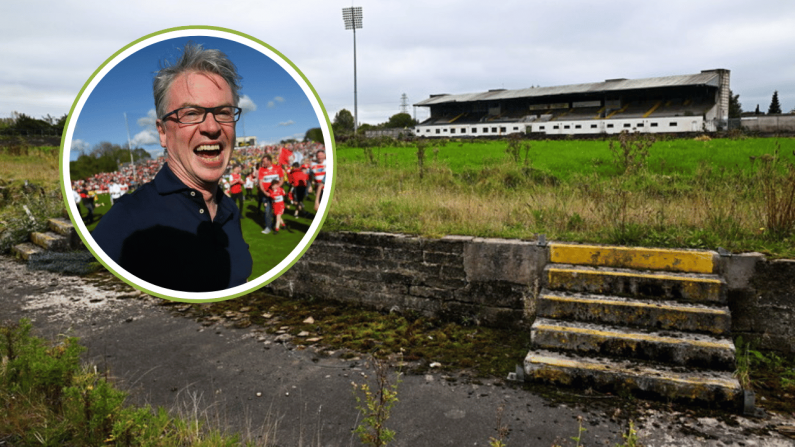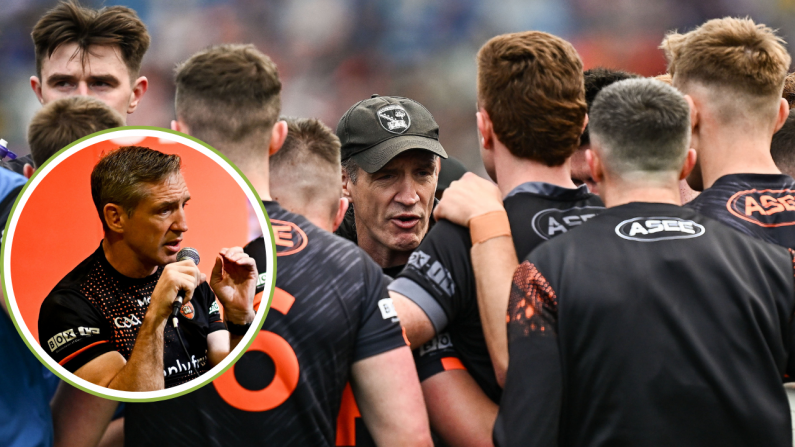One of the debates to emerge from the All-Ireland final related to whether the media should criticise Rob Hennelly. His mistake was so utterly gut-wrenching and the ramifications so final, that it was impossible not to feel sympathy for him as he wept in his team mates arms after the game.
But should he be criticised by the media for his mistake? Conor Cusack probably had the strongest rejection of rob Hennelly criticism. This tweet was in relation to what Cusack perceived as personal criticism towards Hennelly following his costly error:
So should the media be more cognisant of the fact that Hennelly is an amateur athlete who has made a grave error, and do their utmost not to make him feel worse? Or do they have a duty to call it as they see it?
What you are about to read is going to mention the Irish Times and the Sunday Independent, but all media outlets - this one included - have had to ask themselves questions regarding what is fair and what is not when it comes to criticising GAA players.
To debate this, Balls.ie spoke to Alan O'Mara, who is extremely well-placed to discuss the matter. O'Mara is a trained journalist, and has run the GAA's official social media accounts in the past. He is also a goalkeeper who has played at inter-county level with Cavan, and is a prominent mental health advocate within the GAA.
O'Mara tweeted his displeasure with some aspects of the coverage surrounding Hennelly after the final.
Just seen such a tasteless post by @IrishTimesSport on their own FB page with player ratings. Expected much better. No class at all.
— Alan O'Mara (@AOMTHECAT) October 2, 2016
His tweet relates to a Player Ratings post on the Irish Times Facebook page, which used Hennelly's rating as the tagline or caption of the post linking to the Mayo player ratings:
Robert Hennelly - Rating 3
Disastrous selection. His floating kick outs gifted Dublin at least three points, contributed to Lee Keegan’s black card while his inability to gather a routine high ball and subsequent dragging down of Paddy Andrews saw Diarmuid Connolly rifle the penalty that crushed Mayo’s dream.
We began by asking Alan what he found wrong with the media coverage surrounding Hennelly:
You look for balance or fairness. There are one or two pieces that stuck out to me as perhaps being over the line. One of these was a post on the Irish Time Facebook page that I thought was quite tasteless and lacked the class you expect from a publication like the Irish Times. The player rating itself I would have no issue with, but the way it was posted directly to Facebook. I thought it was below the belt.
To pick out his player rating and to post it like that to use it as the headline for the article in many ways, they really hung him out to dry there. If it's in the context of the whole piece, that's fairer and that's balanced, and I think Rob and any inter-county -player would accept that it is part and parcel of the scenario.
Rob and all the rest of the players are lads at the end of the day, they have feelings and emotions and they are hurting like everybody else. To do what the Irish Times did, I felt lacked a certain level of class that I'd expect.
Alan also found fault with a couple of lines of Joe Brolly's column in the Sunday Independent, while also responding to our follow-up question asking whether some of Brolly's phrases are natural for a Sunday newspaper columnist whose job it is to entertain readers:
I thought some of the language Joe used was quite loose. 'Mayo's panic-stricken 'keeper kicks suicidal clearance straight to a Dub' and there was 'the decision to drop Clarke for a 'keeper with a history of wobbles'. I thought that was fairly strong and maybe out of line.
With all columnists, I understand that side of the world. I'd be first in line to complain about the articles that said nothing, and I enjoy Joe's writing. In terms of GAA writing, I find him to be one of the most colourful and the most eloquent but I felt there were parts of that piece that could have been phrased a little bit smoother.
I mean, 'a history of wobbles': I don't know Rob's career that well, but I imagine that most 'keepers have had a wobble at some stage. Stephen Cluxton has had plenty of wobbles over the years too. There aren't many 'keepers around that won't have had a wobble at some stage. He suggested that it was the worst decision he's seen on any All-Ireland final day, and if that's his opinion, that's fine. But to suggest he is a 'keeper with a history of wobbles, I didn't think there was any need for that line. If you read the paragraph without that line, his point comes across just as well.
Look, the decision didn't work out on the day, I think everyone will hold their hands up and say that, but I just thought Joe's language could have been a bit smoother. In fairness, Joe does express that he does have sympathy for him, but as a regular reader, I felt that there were one or two bits that were a little strong..
We then pointed out to Alan that the Irish Times may have led with that tag-line as it was the main talking point and incident from the game, and not to do it would be Alan responded by saying that he understands where they are coming from, but believes that taglines, headlines and anything else along those lines should be weighed up by taking the player into account:
Yeah, I think it should be a bit of both. Listen, I'm a goalkeeper, I'm a qualified journalist, and I've run the GAA's Facebook page and I know what it's like to be the person who runs the social media account. If it was me, in that position, I wouldn't have posted it in that way. That's just my personal opinion.
Realistically, what player ratings should be about is celebrating the best players in the match. When you are taking a player rating out to attract people to read the rest of the piece, I would suggest that it should be the player who got man of the match in the final, that would be my take. I understand the angle that was taken, and I accept that player ratings are part and parcel of the game, and I assume Rob and the rest of the lads accept that too, and in the interests of transparency, I very much doubt the journalist in question had anything to do with posting it in that way.
I just thought it was a bit heartless and a bit cold. I just thought that particular post could have been handled better.
Anyone who plays sport, and at the end of the day, every player loves the idea of getting a man-of-the-match, or an All-Star, so you have to accept that there is a flip side to that. That's ok, I've no issue with that. If I had picked up the paper, and read that in the context of the whole piece, It would have said 'ok, fair enough'.
Can the GAA be taken seriously if the media do not criticize clear mistakes made by players in big games?
To be clear, I'm not suggesting for a second that the player should not be criticised, and I'm not going to argue with that player rating and what it said, I just feel that that comment would have been suited within the context of the full article.
My issue was not with the player rating, but how it was dragged out.
When you play elite sport, criticism is part and parcel, that's what you sign up for. You want it to be balanced. I know people say it's an amateur sport, and All-Ireland final is the biggest day in the sporting calander, and everyone has an opinion of it. As the nature of the online sphere has evolved, a lot of the conversations in pubs and houses that you'd never had heard of 30 years ago are now on an online space, where a lot of people can see them.
I do think that the pressure and criticism is at an all time high for an inter-county GAA player today, I sort of understand where they are all coming from. But for me, as an individual, as a goalkeeper and a trained journalist, I would prefer it not to be constructed in this way.
Alan also pointed out a double-standard relating to the personal abuse of referees:
I would fully agree with you. I would stick my hand up here as well, when as a player you would shout something at a referee in the heat of the battle, it's definitely something we have to be more in tune with. A referee is not there to make a bad call or mess up a game, and anyone who thinks that needs to take a look in the mirror.
One of the things that stuck with me walking out of the stadium, was the sheer speed, physicality and athleticism of the game. For me, those aspects of the game are higher than they ever have been before. The reality is that our game is incredibly difficult to referee.
There's the tackle, and then there's the black card, and I know referees have done a lot of tuning up regarding the implementation of this new rule, but the reality is that 80% of the crowd at a club GAA game don't know what's going on with the black card. And that level of frustration and misunderstanding naturally leads to frustration and abuse very quickly.
We have to realise that, at the end of the day, everyone is there to do their best for their county, or to represent themselves or their communtiy. No one is there to frustrate somebody else. And at the end of the day, we are all people with feelings and emotion, I think it's something we have to look at.
In summary, O'Mara believes that criticism of players exists in the GAA and players should deal with it, but when a player's pain is used to sell a piece rather than another's feats, as it did with parts of the Rob Hennelly criticism, it crosses a line.
You can follow Alan O'Mara on twitter, @AOMTHECAT.
See Also: 'It Breaks My Heart' - Robbie Hennelly Speaks Out About His All-Ireland Final Nightmare

